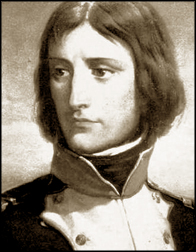Leaders are born - not made
.jpg) Every non-directed collective action turns rapidly into confusion and
disorder. This is very much in evidence in a battle. If there is no
commander, the soldiers will not throw themselves into action.
Similarly, no government or private sector organisation can run its
affairs without a leader. For instance, you cannot publish a newspaper
without the leadership of an editor. If you take a bigger example, no
country can prosper without a leader. Every non-directed collective action turns rapidly into confusion and
disorder. This is very much in evidence in a battle. If there is no
commander, the soldiers will not throw themselves into action.
Similarly, no government or private sector organisation can run its
affairs without a leader. For instance, you cannot publish a newspaper
without the leadership of an editor. If you take a bigger example, no
country can prosper without a leader.
During the World War I, some battalions went to the warfront only to
be defeated by the enemy. When they were led by an efficient commander,
the situation changed dramatically. What we have to remember is that the
armies consisted of the same soldiers. Without leadership they found
that military successes were not possible.
If you look at history, you see great leaders in every sphere of
human activity. Alexander the Great, Akbar the Great, and Julius Caesar
were great leaders who decided the destinies of their respective
nations. Whenever a country finds itself in disorder, a leader comes to
the surface. The situation in Sri Lanka is a glaring example.
President J. R. Jayewardene, President R. Premadasa and President
Chandrika Kumaratunga could not suppress terrorism and as a result the
whole country suffered for nearly 30 years.
 |
|
Napoleon Bonaparte |
They were followed by a fearless leader from the South. Today we can
travel to any part of the country without the fear of bomb explosions,
thanks to the leadership of President Mahinda Rajapaksa. Only people
with short memories can forget this fact.
When a country is ruled by a capable leader, unruly elements in
society always try to upset the apple cart. The so called
revolutionaries may promise the sun and the moon, but they will never be
able to rule a country. History tells us what happened to Russia and
France after the revolution.
Leaders have been chosen by human beings in different ways. For
instance, when a king dies, the kingdom passes on to his eldest
offspring. In modern democracies, we have no kings, but presidents and
prime ministers. They rule a country for a specific period. If a ruler
happens to be incompetent, people can oust him/her and elect another
leader.
This process can be seen even in a small family business. On the
death of a father, his wife or children will lead the organisation. The
employees owe their allegiance to the new leader. Similarly, in certain
democracies such as India and Sri Lanka, the leadership has passed on to
family members. Mrs. Indira Gandhi and Rajiv Gandhi in India and S. W.
R. D. Bandaranaike and Mrs. Sirimavo Bandaranaike in Sri Lanka can be
cited as examples. However, such acts of succession were not automatic;
they had been elected by the people.
The best quality of a leader is that he should be acknowledged as
such by the people. The elected leader should be able to rule his
country without any restraint by the opposition.
What will happen if a country finds itself without a leader? If
people fail to appoint a leader, somebody will assume power. For
instance, Cromwell took leadership of England although nobody appointed
him as the leader.
After the French Revolution, Napoleon Bonaparte made himself the
leader of France. Whether such leaders could retain their power and
popularity is another matter.
An efficient leader possesses immense will-power to face any problem.
He will always weigh the pros and cons before taking a decision. When he
takes a decision he will stick to it. If he hesitates to take decisions,
he is not fit to be a leader. Napoleon Bonaparte used to say, "Firmness
prevails in all things."
An experienced leader knows how to delegate his powers to
subordinates and keep them in check. He has to be firm if they are not
doing their job properly. Even an elected leader can assume the powers
of a benevolent dictator if he is above corruption.
Even after settling a great dispute, a leader cannot remain
complacent because nothing in this world remains permanent. As Napoleon
Bonaparte said, "The most dangerous moment comes with victory,"
Therefore, a true leader has to renew his efforts everyday to rule his
country.
Quoting the French philosopher Andre Maurois's words seems to be
relevant here: "To lead is not a privilege; it is an honour and it is a
trust."
|

